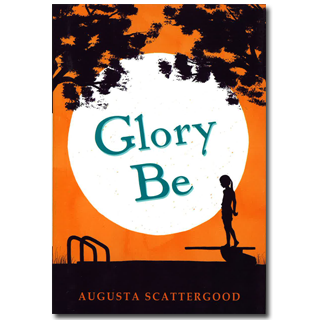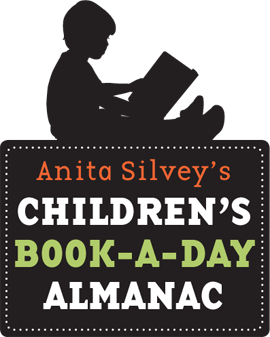
A FEW OTHER EVENTS FOR
JULY 30:
- Happy birthday Marcus Pfister (The Rainbow Fish).
- It’s the birth date of Henry Ford (1863-1947). Read Driven: A Photobiography of Henry Ford by Don Mitchell.
- Happy birthday to Baltimore, Maryland, founded in 1729. Read Goliath: Hero of the Great Baltimore Fire by Claudia Friddell, illustrated by Troy Howell, and Anna All Year Round by Mary Downing Hahn, illustrated by Diane de Groat.
The summer in New England has been unbearable a few days in July; but I can always drive down to the ocean for a fresh breeze. Not so in my landlocked childhood state of Indiana. For many of my summers, the community pool provided the only escape from long, hazy summer days.
Hence I found myself immediately identifying with the heroine of the book of the day: Gloriana Hemphill of Augusta Scattergood’s Glory Be. Eleven years old and living in Hanging Rock, Mississippi, in 1964, Glory looks forward to her twelfth birthday party that is always held at the local swimming pool. When the pool closes, seemingly for repairs, Glory faces a summer unlike any other in her life.
Nothing is quite what it seems in Hanging Rock that summer. Yankee Freedom Workers have come into town, and Glory befriends the daughter of one of them. Glory’s older sister Jesslyn has become involved with a new boy in town, who has been actively engaged in Civil Rights protests. And Glory’s best friend Frankie, son of a bigoted member of the town council, holds beliefs quite different from Glory. In reality the pool has been closed not because of repairs—but to keep it from being integrated. In this small community where people have to decide where they stand on the issues, a courageous town librarian sides with the angels.
Deftly and with great passion, Augusta Scattergood, in her amazing first novel, explores the conflicts of the sixties and the Civil Rights movement. She does so in a way that connects with today’s fourth and fifth grade students. Because Glory is so believable as a character and because her voice is so fresh and funny, readers get swept up in her story and learn a great deal about Civil Rights in the process. The book works very well paired with Kristin Levine’s The Lions of Little Rock and Rita Williams-Garcia’s One Crazy Summer. All three explore the issues of this time period in character-driven novels. Glory Be has been working particularly well in fifth grade classrooms or in book discussion groups. But it can be enjoyed independently as well.
So if you go swimming this summer in the local pool, don’t take for granted that the pool is open to all. As Glory Be reminds us and teaches our children, our inclusive society today exists because of the courage of those willing to fight for the rights of all individuals.
Here’s a passage from Glory Be:
“You girls better enjoy this while you can.” J.T. nodded toward the pool. He was grinning bigger than a cat trapping a mouse. “By next week, it’ll be closed.”
Jesslyn propped herself up on her elbows to look out at the turquoise water. “Closed? In the middle of the summer? You don’t know what you’re talking about, J.T.”
“I know exactly what I’m talking about” was all he said.
When I heard that, I couldn’t stop myself. I stormed over to Jesslyn. “Nobody will close our pool. It’s almost July Fourth, the big parade and all.” I started to say how it was my birthday and I’d has swimming parties here since I was little. But I didn’t. I glared at Frankie’s brother. “Why are you lying about our pool?”
J.T. spit out his toothpick and slicked back his black hair. “I ain’t lying. You can blame it on them Freedom Workers. Those people from up North, in town to help the coloreds vote and swim in our pool. We don’t need outside agitators down here making up new rules.”
Originally posted July 30, 2012.






My favorite character in the book was Frankie. I found Frankie a complex, conflicted, and, ultimately, a sympathetic character. I just wanted to give him a big hug, take him home, feed him a good meal, take care of his wounds, and, most importantly, get him away from his abusive brother and, probably, abusive father. I don’t think that Frankie knew where he stood on the issues of the day – he was too conflicted and didn’t have any peace or moral guidance, like Glory did, to think through the issues. His world was changing so fast and violently, he hadn’t had a chance to process it. Glory came from a stable home where she was loved and received moral guidance both from her father and Emma, her caregiver. Frankie’s home was the complete opposite. I think he was trying to change Glory’s mind so they could continue hanging out together and his brother wouldn’t beat him up; not because he hated the Freedom Riders and what they stood for, though I’m sure he resented them for coming, indirectly, between him and his friend (and surrogate family).
Oh, forgot to mention – Fantastic cover! Brilliant design and artwork both in their own right and as representations of the story. Plus, I loved the detail of having the turquoise endpapers – not only the color of a swimming pool but also a beautiful contrast to the orange cover.
This sounds really good – an excuse to stay inside reading to beat the heat. I love books set in this time period. Thanks for the recommendation.